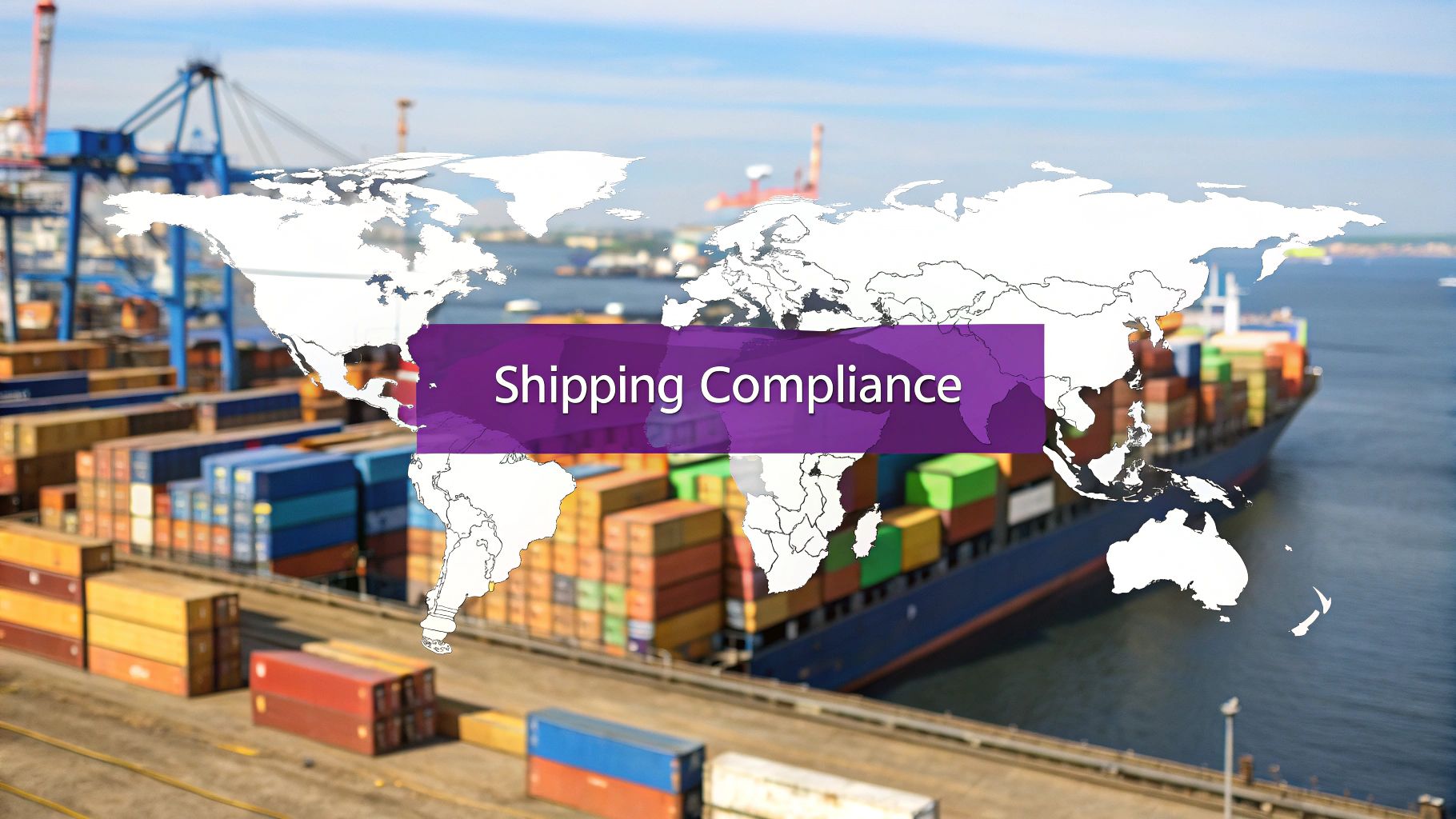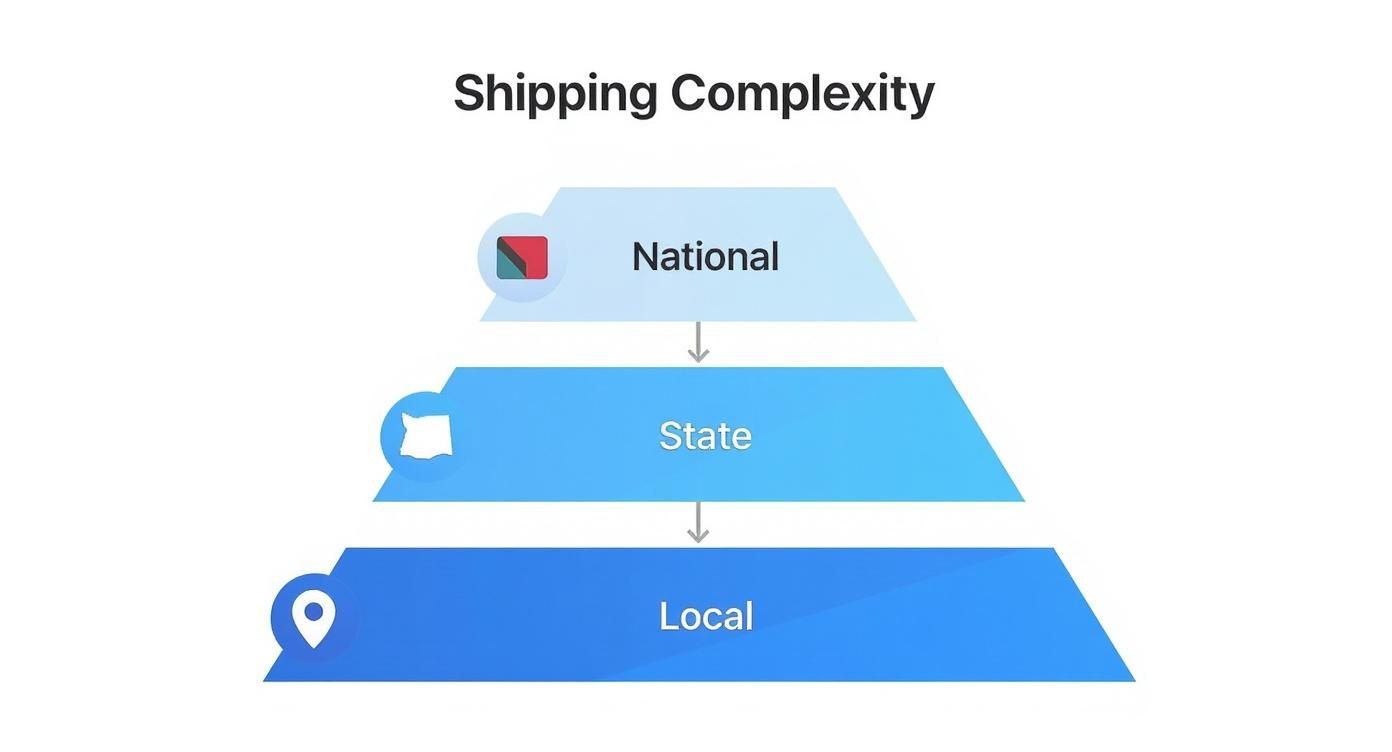
Plan: Why generic shipping plugins fail regulated industries
Why generic shipping plugins fail regulated industries: learn the compliance gaps and UX risks, audit pitfalls, and how to fix them with proven steps.
Cody Y.
Updated on Nov 11, 2025
You’ve spent months, maybe years, building your e-commerce business. You’ve painstakingly curated a fantastic lineup of products—craft spirits, specialty supplements, maybe even high-end blades. Then, one day, you get the call: a shipment has been seized at a state border. Even worse, you're facing thousands in fines because your shipping plugin couldn't tell the difference between Nevada and Nebraska.
This isn’t some far-fetched nightmare. For businesses selling regulated products with generic tools, it's a common and costly reality.
The Hidden Risks of One-Size-Fits-All Shipping
The core problem is that off-the-shelf shipping plugins are designed with a "one-size-fits-all" mentality. They treat every product and every destination the same, focusing on simple metrics like weight, distance, and flat rates. This model is perfectly fine if you're selling t-shirts or coffee mugs, but it completely falls apart when compliance is on the line.

Why Simplicity Becomes a Liability
When you're dealing with regulated goods, shipping isn't just about logistics—it’s a legal function. The rules aren't uniform across the country; they shift from state to state, county to county, and sometimes even down to a specific ZIP code. A generic plugin is like a basic calculator: perfect for simple addition, but totally useless for the complex financial modeling needed to run a real business.
For a regulated business, your shipping system has to be your first line of defense. It needs to understand and adapt to a messy, ever-changing legal map to protect you from catastrophic compliance failures right at the checkout, not after the order is already packed and labeled.
This is exactly where generic shipping plugins create dangerous blind spots. They just don't have the architecture to handle the details that matter.
Core Failures of Generic Plugins in Regulated Shipping
Let's break down the specific ways these standard tools fail and the direct impact on your business. This table summarizes the critical gaps that expose merchants to unnecessary risk.
| Area of Failure | Why Generic Plugins Fall Short | Direct Business Consequence |
|---|---|---|
| Jurisdictional Logic | Can't distinguish between a state where a product is legal and a neighboring one where it's banned. They see all addresses as equal. | Illegal sales, seized shipments, and potential fines from state regulators. |
| Granular Rule Engine | Lacks the ability to enforce complex rules like quantity limits, product combinations, or time-based restrictions (e.g., no alcohol shipments on Sunday). | Over-selling restricted items to a single customer, violating local ordinances, and facing penalties. |
| Audit Trails & Logging | Fails to record why a shipping option was blocked or an order was prevented. There's no defensible record of compliance actions. | Inability to prove due diligence during an audit, leaving you exposed to legal action and fines. |
| Performance & UX | Often relies on clumsy, site-slowing workarounds to approximate rules, leading to a confusing and frustrating checkout experience for customers. | High cart abandonment rates, lost revenue, and damage to your brand's reputation. |
| Maintenance Burden | Forces developers to create and maintain brittle, custom-coded patches that break with every plugin update, creating technical debt. | Skyrocketing development costs, site instability, and a constant cycle of fixing broken code instead of growing the business. |
Ultimately, relying on a generic plugin for regulated products is like trying to navigate a minefield with a tourist map. It shows you the main roads but offers zero warning about the hidden dangers just a few feet off the path.
This isn't just about canceled orders or frustrated customers. It’s about jeopardizing your entire business, inviting legal action, and causing irreparable damage to your brand. For merchants in regulated spaces, a specialized, compliance-aware shipping system isn't a luxury—it’s a foundational requirement for survival and growth.
The Tangled Web of Shipping Rules
When you're selling regulated products, the real headache isn't just getting a package from your warehouse to a customer's door. It's navigating the invisible maze of laws that governs every single inch of that journey. A generic shipping plugin sees a simple math problem: weight + distance = cost. But for regulated goods, it’s a legal minefield, and the map is always changing.
Think of it this way. A standard GPS is great for getting you down the interstate. But what happens when your route cuts through private land, where every property has a different owner, a different gate, and different rules about who can pass? Your trusty GPS would be totally useless. You'd need a specialized system that understands the legal landscape, property by property.
That’s the exact problem with off-the-shelf shipping tools. They simply weren't built to handle the kind of jurisdictional complexity that compliance demands.
The Patchwork of State and Local Laws
Regulations are almost never a one-size-fits-all deal. They shift at state lines, county borders, and sometimes even at specific zip codes. Take wine, for example. There's no single national law for shipping it. Instead, you're dealing with a chaotic mess of individual state and local statutes. One state might be fine with direct-to-consumer shipments, while its next-door neighbor forbids it completely.
It gets even trickier. A state might allow sales but cap the volume, letting a customer buy no more than two cases per year. This means your system can't just block or allow a state; it has to track the cumulative purchase history for every customer and check it against location-specific limits.
The core failure of generic plugins is their inability to process what experts call ‘jurisdictional logic’—a deep, dynamic understanding of thousands of distinct legal areas. Without this logic, a business is essentially shipping blind, exposed to violations they may not even know exist.
For instance, a single product might be perfectly legal to ship to one city but completely illegal in an adjacent town within the same county. You can see why a simple state-level check just doesn't cut it. To really get into the weeds on this, check out our guide on why state compliance isn’t enough for regulated shipping.
When Regulations Cross International Borders
This isn't just a domestic problem; it's a global one. The maritime shipping industry, for instance, is facing an ever-growing list of intricate regulations that generic solutions can't touch. Just recently, the U.S. Trade Representative proposed a slew of new service fees and restrictions aimed at maritime transport operators.
The proposal includes a complex web of tiered fees, discriminatory applications, and specific refund mechanisms that have to be applied based on the carrier and the cargo. You can find the nitty-gritty details in the official press release. A standard plugin just doesn't have the architecture to implement these kinds of layered, conditional rules.
This is a perfect illustration of why generic shipping plugins fail regulated industries. They are built on a foundation of simplicity that is completely at odds with the messy, multi-layered reality of legal compliance. Basic "if this, then that" logic just can't keep up with the thousands of variables at play.
The High Cost of Getting It Wrong
When a generic plugin gives the green light to an illegal shipment, the fallout can be devastating. Businesses are exposed to a range of risks that can cripple their operations overnight:
- Seized Shipments: Packages get confiscated by state authorities, which means lost product and lost revenue.
- Hefty Fines: Regulatory bodies can slap you with massive financial penalties, often running into thousands of dollars for a single violation.
- Loss of Licenses: Rack up enough violations, and you can lose the essential business licenses you need to sell your products, effectively shutting you down.
- Brand Damage: News of compliance failures spreads fast. It erodes customer trust and can permanently tarnish your brand's reputation.
These risks drive home a critical truth: for a business in a regulated industry, a shipping plugin isn't just a logistical tool. It’s a core piece of your legal compliance framework. Relying on a generic solution is a high-stakes gamble that very few businesses can afford to lose. The only way forward is a specialized system, built from the ground up to understand and enforce the complex web of shipping regulations.
Why Granular Shipping Rules Are Non-Negotiable
When you're selling regulated products, your shipping logic isn't just a feature—it's the very foundation of your compliance strategy. It’s not enough to block sales to an entire state. The real test is enforcing the specific, practical rules that make generic plugins buckle under the pressure.
Think about it. You might need to block vape sales to customers under 21, prevent a specific combination of firearm accessories from being added to the same cart, or stop perishable food from being shipped to a P.O. Box. These aren't obscure edge cases; for many businesses, they're daily operational requirements.
This infographic breaks down the hierarchy of regulations that merchants have to navigate, from broad federal laws down to hyper-local city ordinances.

As you can see, compliance isn't a single checkpoint. It's a complex web where national, state, and local rules all overlap and interact.
A generic shipping plugin is like a simple on/off light switch. It can allow or deny shipping to an entire state, and that’s about it. This all-or-nothing approach is dangerously inadequate for industries where the rules are full of nuance. You need a system that acts more like a smart home, letting you create layered, conditional rules that adapt to every unique checkout scenario.
The Power of Conditional Logic in Shipping
This is where granular control becomes an absolute necessity. It’s the ability to build rules based on multiple conditions at once. A standard plugin might let you block a product from shipping to California, but what if you need to enforce a rule like this?
"Block Product X from shipping to California only if the cart also contains Product Y and the customer's account is less than 90 days old."
That level of detail is simply impossible with out-of-the-box tools. The importance of this kind of precision is also clear when it comes to pricing, with many businesses struggling with setting granular shipping fees for products and add-ons. Without a powerful rules engine, you’re stuck with constant manual order reviews, a process that’s both slow and ripe for human error.
A specialized solution like Ship Restrict delivers this "smart home" capability. It lets merchants build an unlimited number of layered rules based on product attributes, customer data, cart contents, and specific geographic zones. This ensures every single transaction is automatically vetted against a comprehensive compliance checklist.
Real-World Scenarios Where Generic Plugins Fail
Let's look at a few concrete examples where a simple "block state" rule just won't cut it, and granular control is the only path to compliance and efficiency.
- Quantity and Weight Limits: A business selling agricultural supplies might be legally required to limit the sale of a certain fertilizer to 50 lbs per household per month in specific rural counties to comply with environmental regulations.
- Customer-Specific Rules: A merchant could need a rule that allows wholesale buyers (identified by a specific user role) to purchase items in bulk, while restricting retail customers in the very same state to a maximum of three units per order.
- Combination Restrictions: A store selling blades and outdoor gear might be legally barred from shipping a specific type of automatic knife and a sharpening kit in the same package to certain cities, even though both items are legal to sell individually.
Each of these scenarios demands a system that can look beyond a simple address and analyze the entire context of an order—who is buying, what they are buying, and how much they are buying. This is the fundamental difference between basic shipping calculation and true compliance automation. Generic tools were built for the former, and that’s precisely why they fail regulated industries so catastrophically.
The Performance and User Experience Nightmare
When a generic shipping plugin hits the wall of regulatory complexity, merchants often get creative—but not in a good way. They start bolting on bits and pieces of code, stacking plugins, and writing custom logic to force a simple tool to do a lawyer's job.
This isn't a solution; it's a house of cards. Each "fix" adds another layer of complexity, creating a fragile, tangled mess that developers call technical debt. While it might seem to work for a week or a month, this patchwork system inevitably grinds the checkout process to a halt, creating a slow, frustrating experience that sends customers running.

How Technical Debt Kills Conversions
The most immediate casualty of this stitched-together system is speed. At the most critical moment—checkout—the server is forced to wade through a convoluted swamp of rules from multiple sources just to validate a single cart.
This hesitation is deadly for sales. Studies consistently show that even a one-second delay in page load time can slash conversions by a staggering 7%.
When a customer finally clicks "Place Order," they’re often met with a dead end. The experience breaks down in a few common, deeply frustrating ways:
- Vague Error Messages: The system blocks a valid purchase but spits out a useless error like, "No shipping methods available," leaving the customer confused, annoyed, and ready to abandon their cart.
- False Declines: A perfectly legitimate customer gets blocked because the tangled rules misinterpreted their location or the specific combination of products in their cart.
- Post-Purchase Cancellations: This is the worst-case scenario. The order goes through, only for a manual review to catch a compliance violation. You then have to cancel the order, issue a refund, and apologize—a process that destroys brand trust.
This chaotic and unpredictable checkout is a direct result of using the wrong tool for the job. A system built from mismatched parts can't deliver the seamless, trustworthy experience modern customers expect, especially on mobile. Ensuring compliance on all devices demands a solution built for this specific challenge.
The Contrast: A Purpose-Built Solution
Now, picture a different scenario. Instead of that chaotic mess, imagine a checkout powered by a specialized solution like Ship Restrict. It’s engineered from day one to handle complex compliance logic efficiently.
Instead of a dozen clunky add-ons fighting each other, a single, optimized rules engine validates the entire order in milliseconds. This is the core technical reason generic plugins fail regulated industries—they simply weren't designed to run thousands of jurisdictional checks without bringing the whole site to its knees.
For the customer, the difference is night and day. A compliant checkout built with the right tool feels effortless. All the heavy lifting happens instantly and invisibly. The customer just enters their address, sees their valid shipping options, and completes their purchase without a hitch.
This is more than just good UX. It's about building the long-term confidence and trust essential for any business operating in a regulated market.
The High Cost of Failing a Compliance Audit
When regulators come knocking, "I think the plugin blocked it" isn't going to cut it as a legal defense. In the world of regulated commerce, hope is not a strategy, and ambiguity is a massive liability. You have to be able to prove, with absolute certainty, why every single shipping decision was made.
This is where generic shipping plugins reveal their most dangerous flaw: a complete and utter lack of auditability. They are built to do one simple job—calculate shipping rates. They were never designed to be a defensible system of record for legal compliance.

The Missing Audit Trail
Sure, a generic plugin might block a shipment to a restricted state, but it almost never logs the specific rule that triggered that action. Was it a state law, a county ordinance, or a customer-specific restriction you had in place? Without a detailed log, you have no way of knowing—and more importantly, no way of proving your due diligence to an auditor.
This isn't just sloppy record-keeping; it's a huge legal vulnerability. If you're audited, you're left with no evidence to defend your business. The burden of proof is on you, and a generic tool leaves you completely empty-handed.
The real cost of a shipping plugin isn't its sticker price—it's the risk it helps you avoid. A failed audit can result in fines that dwarf the cost of a specialized solution, making compliance an investment, not an expense.
The Financial and Reputational Fallout
The penalties for non-compliance are devastating, and they go way beyond a simple slap on the wrist. Businesses that fail audits often face a cascade of consequences that can threaten their very existence.
- Steep Financial Penalties: Fines for shipping violations can range from thousands to tens of thousands of dollars per infraction. A single bad week of shipments could easily result in penalties that cripple a small business.
- License Revocation: Repeated failures can lead to the suspension or outright revocation of your business licenses, effectively shutting you down.
- Legal Fees and Lawsuits: Defending your business against regulatory action is an expensive, time-consuming nightmare that drains resources better spent on growth.
- Irreparable Brand Damage: News of a failed audit travels fast. The loss of customer trust can be far more damaging in the long run than any fine.
These consequences highlight why generic shipping plugins are such a poor fit for regulated industries. They are architecturally incapable of providing the one thing you need most in an audit: proof.
The Hidden Costs of Customization
To bridge this gap, some businesses try to bolt custom logging features onto their generic plugins. This path is almost always a dead end. We've seen companies discover they need 60-80% additional custom development just to meet baseline compliance needs. For instance, the complex vessel and ownership restrictions of the Jones Act in the United States fundamentally break the simple logic of generic international shipping plugins. You can explore more about these regulatory challenges and their impact on technology choices.
A purpose-built solution like Ship Restrict is designed for compliance from the ground up. It creates a detailed, unchangeable log for every transaction, recording which specific rule was triggered, when it happened, and why the shipping decision was made. This creates an indispensable audit trail that serves as your business’s best defense, turning a potential catastrophe into a routine compliance check.
How to Choose a Compliant Shipping Solution
<iframe width="100%" style="aspect-ratio: 16 / 9;" src="https://www.youtube.com/embed/gLun8Nbml6U" frameborder="0" allow="autoplay; encrypted-media" allowfullscreen></iframe>Knowing the risks of generic plugins is one thing. Taking action to protect your business is another. Choosing a compliant shipping solution isn't just about dodging fines—it’s about building an operation that can actually scale without breaking. It means you have to stop seeing shipping as a simple cost center and start treating it as a core piece of your legal and operational strategy.
Sure, there are tons of resources out there listing the various e-commerce plugins available, but if you’re selling regulated products, you have to look deeper. A truly compliant solution is built on a foundation of precision, auditability, and dynamic control. It has to directly solve the problems why generic shipping plugins fail regulated industries.
The Core Pillars of a Compliant System
To get from awareness to action, you need a practical framework for evaluating your options. Don't get lost in endless feature lists. Instead, focus on the architectural pillars that separate a real compliance tool from a standard shipping calculator. Any solution you even consider must nail these four non-negotiable areas.
-
A Dynamic and Granular Rules Engine: Your system has to go way beyond simple state-level blocks. You need the ability to create layered, conditional rules based on product attributes, what’s in the cart, customer data, and specific geographic zones like counties or even ZIP codes.
-
Comprehensive Jurisdictional Databases: The platform must maintain—and constantly update—a deep database of shipping laws. Ask potential vendors how they keep their data current with the thousands of local, state, and federal regulations that seem to change every other week.
-
Detailed and Defensible Audit Logs: If you ever face an audit, you need proof. The solution has to provide unchangeable, detailed logs for every single transaction, showing exactly which rule was triggered and why a specific shipping decision was made.
-
Expert Support and Maintenance: Compliance is not a "set it and forget it" job. Make sure the provider offers expert support from a team that actually understands the nuances of regulated e-commerce and handles all the backend legislative updates for you.
Your Evaluation Checklist
Use this checklist as you compare different options. A truly robust solution should tick every single box, giving you peace of mind and a serious competitive advantage. You can see a detailed breakdown in our comparison guide for the best shipping restriction plugins, which uses these criteria to evaluate real-world tools.
A truly compliant shipping tool doesn't just block orders; it builds confidence. It assures you, your customers, and regulators that every package that leaves your warehouse does so legally, safely, and with a clear, defensible record of due diligence.
Investing in the right tool transforms compliance from a source of constant anxiety into a well-managed business function. It frees you up to focus on growth, knowing your operations are built on a solid, legally sound foundation. A specialized tool like Ship Restrict is engineered from the ground up to meet these demands, turning complex legal headaches into a seamless, automated process that protects your business at every step.
Got Questions? We've Got Answers
Stepping into the world of regulated shipping can feel like navigating a minefield. Below are the straight answers to the questions we hear most often from merchants, helping you understand the real-world value of getting compliance right from day one.
How Much Does a Specialized Plugin Cost Compared to a Generic One?
While a dedicated tool like Ship Restrict has a higher price tag than a generic plugin, the real conversation is about the total cost of ownership. A cheap or free tool is often a down payment on future headaches—thousands in custom coding, endless maintenance, and the catastrophic cost of a failed compliance audit.
Think of it this way: a single shipping violation can trigger fines that dwarf the annual cost of a purpose-built solution. A specialized plugin isn't just another software expense; it's an investment in keeping your business safe and operational.
Can't I Just Manually Review Orders for Compliance?
Relying on manual review is a high-stakes gamble that simply doesn't scale. As your business grows, so does your order volume, making it almost impossible to catch every single compliance issue. This method is a breeding ground for human error, creates massive fulfillment delays, and leads to a terrible customer experience when you have to cancel an order after it's already been placed.
Automation isn't a luxury—it's a necessity for accuracy and speed. A specialized tool can check an order against thousands of jurisdictional rules in milliseconds. That's a task that would take a human hours to complete, with far less certainty.
How Do I Know the Rules in a Specialized Plugin Are Up to Date?
This is one of the biggest reasons to go with a premium, specialized solution. Reputable providers have teams dedicated to monitoring legislative changes at the federal, state, and even local levels. When a law changes, those updates are pushed directly to your store, ensuring you stay compliant without having to become a legal scholar yourself.
It’s a core reason why generic shipping plugins fail regulated industries—they provide the framework but leave all the legal heavy lifting and ongoing maintenance squarely on your shoulders.
What Happens if a Customer Challenges a Shipping Restriction?
A specialized plugin gives you the proof you need to stand your ground. Instead of showing a vague "shipping not available" error, you can configure your checkout to display clear, specific reasons for the restriction.
Even better, the plugin's audit logs create a bulletproof record. You can see exactly which rule—down to a specific county ordinance—blocked the shipment. This not only protects your business from disputes but also demonstrates that you’re performing the necessary due diligence to stay compliant.
Ready to stop gambling with compliance and start shipping with confidence? Ship Restrict automates the complex web of shipping rules for WooCommerce, saving you time, eliminating costly mistakes, and protecting your business.

Cody Yurk
Founder and Lead Developer of ShipRestrict, helping e-commerce businesses navigate complex shipping regulations for regulated products. Ecommerce store owner turned developer.